On October 30th, the Biden Administration released its Executive Order on safe, secure and trustworthy Artificial Intelligence to guide the use of AI across a number of sectors, including education. This is welcome guidance for district leaders and educators who have been navigating a landscape rife with new AI-powered solutions following the launch of ChatGPT in November 2022. 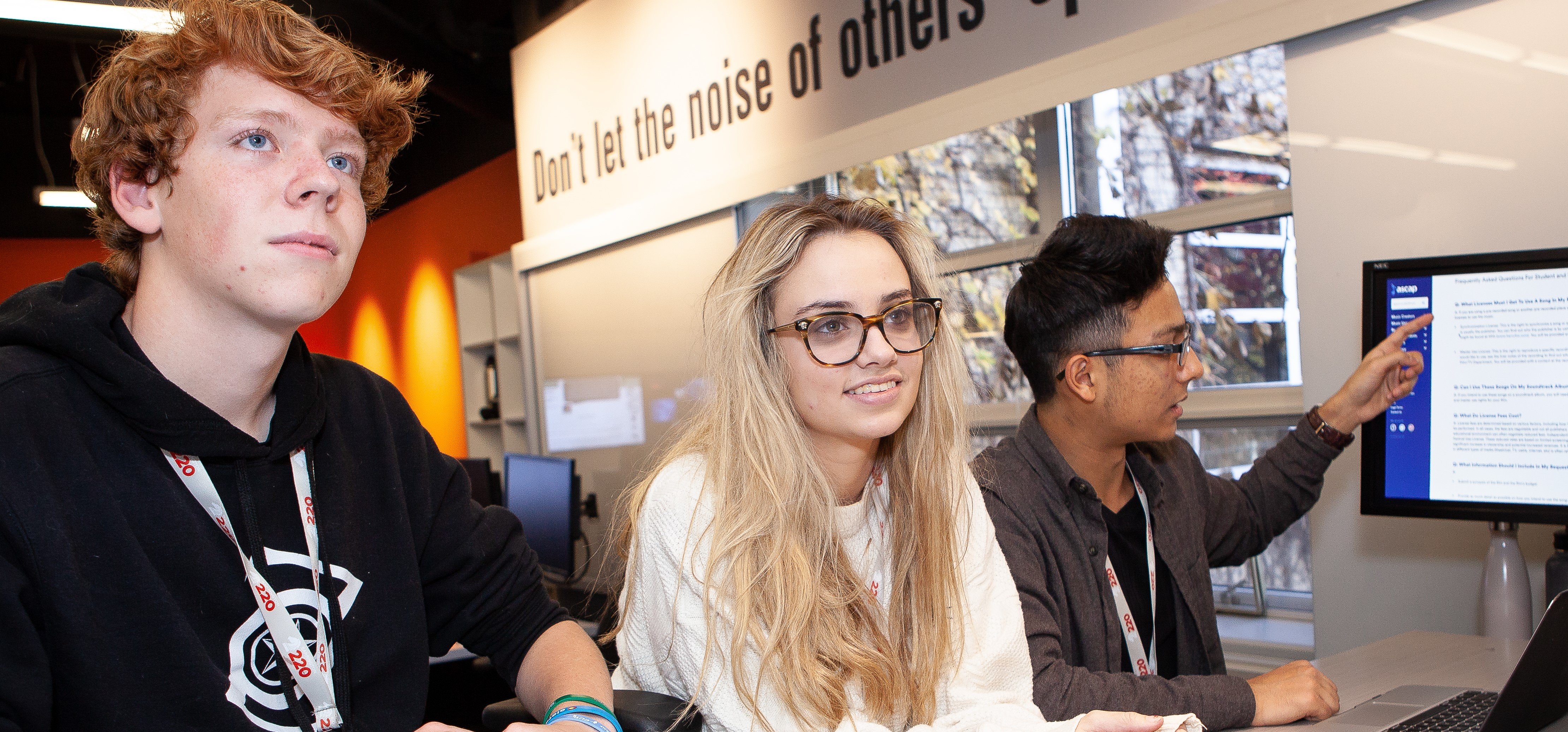
Of equal importance for those district leaders and educators is the impact AI will have on the future of our students. As a recent White House report notes, “AI has the potential to increase productivity, create new jobs, and raise living standards. However, by its very nature of performing “non-routine” tasks formerly thought to be strictly the domain of humans, AI is likely to disrupt large swaths of jobs and tasks.” As educators and leaders entrusted with preparing our students for success in the world, it’s imperative that we teach them about AI, not just what it is, but how it can be used productively.
Where should schools begin?
It's difficult to know where to begin, and looking ahead, how do schools keep pace with the rapid developments of emerging technologies? Our district, Barrington D220, dove into this work by starting where many other districts have kicked off their AI efforts: by setting expectations on the acceptable use of AI by students. First, we didn’t restrict the use of AI. The genie was already out of the bottle and students could always use the tools when they were off our system. Perhaps more importantly, we knew that restricting the use of AI would create equity issues for students who lack access to the internet or these tools when they aren’t in our schools. Instead we embraced AI and updated our district’s responsible use policies to incorporate AI and then worked across stakeholders, including students, teachers and families, to develop common language and shared expectations around its use. 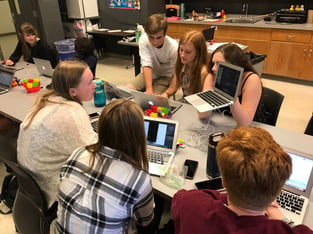 Next, we know that our teachers, like most educators and administrators believe that AI will have a significant impact on education, but lack the resources to put it to use in their classrooms. So, we are in the early stages of developing tools to support lesson planning that integrates AI along with professional development opportunities to improve educators' understanding of AI, respond to their concerns and explore evolving practices around the use of AI.
Next, we know that our teachers, like most educators and administrators believe that AI will have a significant impact on education, but lack the resources to put it to use in their classrooms. So, we are in the early stages of developing tools to support lesson planning that integrates AI along with professional development opportunities to improve educators' understanding of AI, respond to their concerns and explore evolving practices around the use of AI.
Responsible use policies, tools and training aren’t enough.
Given how quickly the field of AI is changing, it’s unreasonable to expect students and teachers to get everything they need from a curriculum and training. And it will be difficult, perhaps impossible, for a district to continually update a curriculum in a never-ending race with emerging technologies reshaping our world – several steps behind and always playing catch-up.
Building AI skills and capacity through entrepreneurship.
This is where authentic learning experiences—such as student entrepreneurship education programs—are proving to be powerful tools for building student and educator capacity regarding the use of AI.
Entrepreneurship education—in particular Uncharted Learning’s INCubatoredu program—has been a core part of our district’s student offerings since 2013. In the INCubatoredu program, students work together using the lean startup approach to develop real products using real-world technologies and processes to solve real-world problems. Students then pitch their product to a panel of investors in the hopes of securing funding for their venture. 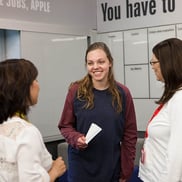 Along the way, a key component of the INCubatoredu program is the role of mentors and experts who work closely with the teams. For instance, teams might engage with a website developer to learn more about how to create the site for their solution, or they could learn about manufacturing from actual industry leaders who deal with manufacturing processes daily. The best part of this interaction with industry experts is that it is always relevant and up-to-date, and serves as an enhancement to traditional “book learning.”
Along the way, a key component of the INCubatoredu program is the role of mentors and experts who work closely with the teams. For instance, teams might engage with a website developer to learn more about how to create the site for their solution, or they could learn about manufacturing from actual industry leaders who deal with manufacturing processes daily. The best part of this interaction with industry experts is that it is always relevant and up-to-date, and serves as an enhancement to traditional “book learning.”
And it isn’t only students who learn from this interaction. Our entrepreneurship educators also develop their capacity on topics like marketing and even AI as they engage with the teams and the experts as well. Over time, the educators also become experts on topics like ideation or, perhaps, AI fueling their own lifetime learning journey and feeding their joy of teaching.
Real-world, relevant learning for students and teachers.
Importantly, we didn’t need to develop a curriculum for either the students or educators on using AI in an entrepreneurship program. Students engage with AI because they need it to address the problem they are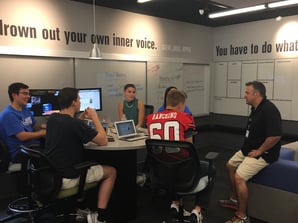 trying to solve, just like real companies do. Some teams are using AI in the ideation process, leveraging the new technology to assist in the creation of survey or interview questions, or in interrogating aspects of and providing feedback on their business models. Other teams are incorporating AI systems into their solutions. All of the students and their teachers are learning and honing new skills for using emerging technology, such as how to craft meaningful and effective prompts and analyzing and validating the data and information generated by AI systems.
trying to solve, just like real companies do. Some teams are using AI in the ideation process, leveraging the new technology to assist in the creation of survey or interview questions, or in interrogating aspects of and providing feedback on their business models. Other teams are incorporating AI systems into their solutions. All of the students and their teachers are learning and honing new skills for using emerging technology, such as how to craft meaningful and effective prompts and analyzing and validating the data and information generated by AI systems.
As new technologies continue to emerge, shaping and reshaping the world of work, authentic learning experiences like entrepreneurship education will need to play an increasingly important role in K-12 education.
 Ty Gorman is the Director of Innovation at Barrington School District 220. He's an experienced K-12 educational leader passionate about improving learning ecosystems. Ty specializes in applying research in motivation and cognitive science to the integration of pedagogy, technology, and instructional environments.
Ty Gorman is the Director of Innovation at Barrington School District 220. He's an experienced K-12 educational leader passionate about improving learning ecosystems. Ty specializes in applying research in motivation and cognitive science to the integration of pedagogy, technology, and instructional environments.
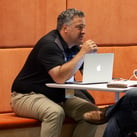 Hagop Soulakian is the INCubatoredu instructor and inaugural teacher of the program at Barrington High School, Barrington 220 School District. 'Hags' is a champion of student entrepreneurship and 'walks the talk' of thinking outside the box, and being agile while supporting student-driven, authentic learning experiences.
Hagop Soulakian is the INCubatoredu instructor and inaugural teacher of the program at Barrington High School, Barrington 220 School District. 'Hags' is a champion of student entrepreneurship and 'walks the talk' of thinking outside the box, and being agile while supporting student-driven, authentic learning experiences.